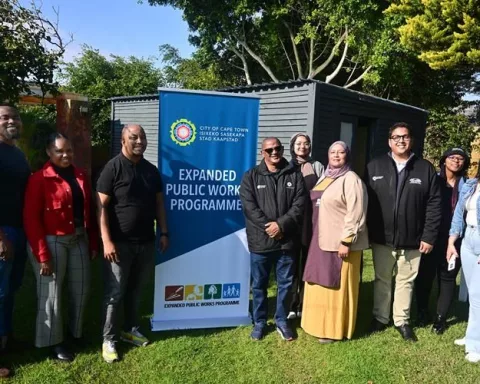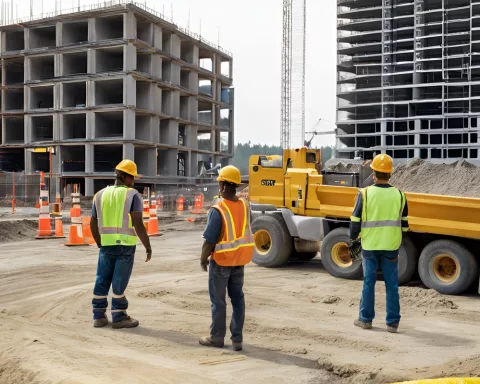The Expanded Public Works Programme (EPWP) is a government initiative in South Africa that aims to create job opportunities for those who cannot enter the formal economy. Over the past 20 years, it has created more than 14 million job opportunities across different sectors, from early childhood development to community crime deterrence. The EPWP has transformed lives and communities, instigating positive change across the nation, and its success has even extended beyond South Africa’s borders. As the EPWP enters into its next phase, the government is committed to enhancing the quality of service delivery, boosting youth involvement, and fortifying skills development.
What is the Expanded Public Works Programme (EPWP)?
The EPWP is a government initiative that aims to create employment opportunities for those who are unable to enter the formal economy. Over the past 20 years, it has created more than 14 million job opportunities across different sectors, including early childhood development, community crime deterrence, and school feeding programs. The EPWP has transformed lives, energized communities, and instigated positive change across South Africa.
Setting the Stage
In the vibrant metropolis of East London, under the roof of Buffalo City Stadium, President Cyril Ramaphosa, sporting the South African flag, was all set to mark the 20th Anniversary of the Expanded Public Works Programme (EPWP). An eager crowd of attendees, participants, and fellow South Africans – ranging from Ministers to traditional leaders, from labour advocates to religious organizations – were in anticipation, primed to join in the momentous commemoration.
The Genesis and Impact of EPWP
Initiated in 2004 in Limpopo, the EPWP emerged as a beacon of hope amidst the looming shadow of joblessness that was plaguing the South African economy. The initiative aimed to carve out employment avenues for those who were unable to penetrate the formal economy. In the twenty years since its establishment, the EPWP has transformed lives, energized communities, and instigated positive change across the nation.
Over the course of years, the EPWP has triumphantly created over 14 million job opportunities across different sectors. With the participation of more than 300 public bodies across various governmental domains, combined with the backing of non-profit organizations, the EPWP has proven to be a pivotal force in alleviating poverty and unemployment.
Manifestations of EPWP’s Success
Evidence of the EPWP’s influence can be seen all around. The participants have spearheaded diverse projects, from mending deteriorating road infrastructures to initiating environmental programmes such as Working on Waste. The initiative also encompasses projects like the Welisizwe rural bridges, intended to facilitate improved access to markets, schools, and clinics.
Beyond that, the EPWP has also facilitated participant involvement in Early Childhood Development, community crime deterrence, and school feeding programmes. Watching the Working on Fire teams from the EPWP combat the intense Western Cape fires has been a moment of national pride.
Reaching Beyond Borders
The scope of EPWP extends beyond South Africa’s national boundaries. The initiative has garnered global recognition, with nations seeking aid from the Working on Fire teams. Certain participants have even advanced, receiving training as emergency response personnel, members of the South African Police Force, and pilots.
The thriving success of EPWP is a result of the effective collaboration among different government departments and agencies. The initiative has already disbursed an impressive R41 billion to impoverished households over the past five years, ensuring participants and their families sustain a life above the poverty threshold.
Aligning with the National Development Plan
The National Development Plan, South Africa’s roadmap for transformation, reiterates the need to expand public employment, especially focusing on youth and women. It advocates for upgrading the nation’s skills pool through improved education and vocational training, a step towards rendering South Africa a more inclusive and fair society.
With youth unemployment exceeding 50%, the EPWP and other public and social employment initiatives have been essential policy tools to combat joblessness and decrease poverty. The initiative has instilled a sense of ownership among communities, empowering them to address local requirements and build resilience.
EPWP: Reflection and Future Plans
As the EPWP celebrates its 20th year, it provides a perfect juncture to reflect on past experiences and strategize for the future. Insights from the past need to be integrated into the upcoming phase, and the quality of work experience offered to participants needs an upgrade.
The forthcoming phase of the EPWP, Phase 5, is committed to embracing more systematic approaches to public employment, enhancing the quality of service delivery. It is also pledged to boost youth involvement and fortify skills development.
As South Africa advances into this new phase, it is paramount to ensure that corruption, favoritism, or nepotism find no room. The Government has vowed to provide five million job opportunities over the next five years.
The EPWP is more than just a programme; it embodies a pledge for a brighter future, a vow to leave no one behind. As South Africa stands on the cusp of a new phase, it is time to mobilize the nation to work, to make the next phase of the EPWP an even greater triumph. It is time for South Africa to rise, united and resilient.
What is the Expanded Public Works Programme (EPWP)?
The EPWP is a government initiative that aims to create employment opportunities for those who are unable to enter the formal economy. Over the past 20 years, it has created more than 14 million job opportunities across different sectors, including early childhood development, community crime deterrence, and school feeding programs. The EPWP has transformed lives, energized communities, and instigated positive change across South Africa.
How has the EPWP impacted South Africa?
The EPWP has created over 14 million job opportunities across different sectors and has been a pivotal force in alleviating poverty and unemployment in South Africa. The program has also spearheaded diverse projects, from mending road infrastructure to initiating environmental programs like Working on Waste. It has facilitated participant involvement in Early Childhood Development, community crime deterrence, and school feeding programs.
Has the EPWP had any impact outside of South Africa?
Yes, the scope of EPWP extends beyond South Africa’s national boundaries. The initiative has garnered global recognition, with nations seeking aid from the Working on Fire teams. Certain participants have even advanced, receiving training as emergency response personnel, members of the South African Police Force, and pilots.
How does the EPWP align with the National Development Plan?
The National Development Plan advocates for upgrading the nation’s skills pool through improved education and vocational training, a step towards rendering South Africa a more inclusive and fair society. With youth unemployment exceeding 50%, the EPWP and other public and social employment initiatives have been essential policy tools to combat joblessness and decrease poverty.
What are the goals for the future of the EPWP?
The forthcoming phase of the EPWP, Phase 5, is committed to embracing more systematic approaches to public employment, enhancing the quality of service delivery. It is also pledged to boost youth involvement and fortify skills development. The government has vowed to provide five million job opportunities over the next five years.
How can the EPWP continue to succeed in the future?
As the EPWP celebrates its 20th year, it provides a perfect juncture to reflect on past experiences and strategize for the future. Insights from the past need to be integrated into the upcoming phase, and the quality of work experience offered to participants needs an upgrade. It is paramount to ensure that corruption, favoritism, or nepotism find no room in the program. The government and the nation need to work together to make the next phase of the EPWP an even greater triumph.












